The Plextor M3 (256GB) Review
by Kristian Vättö on April 5, 2012 3:05 AM ESTRandom and Sequential Read/Write Speed
The four corners of SSD performance are as follows: random read, random write, sequential read and sequential write speed. Random accesses are generally small in size, while sequential accesses tend to be larger and thus we have the four Iometer tests we use in all of our reviews. Our first test writes 4KB in a completely random pattern over an 8GB space of the drive to simulate the sort of random access that you'd see on an OS drive (even this is more stressful than a normal desktop user would see). We perform three concurrent IOs and run the test for 3 minutes. The results reported are in average MB/s over the entire time. We use both standard pseudo randomly generated data for each write as well as fully random data to show you both the maximum and minimum performance offered by SandForce based drives in these tests. The average performance of SF drives will likely be somewhere in between the two values for each drive you see in the graphs. For an understanding of why this matters, read our original SandForce article.
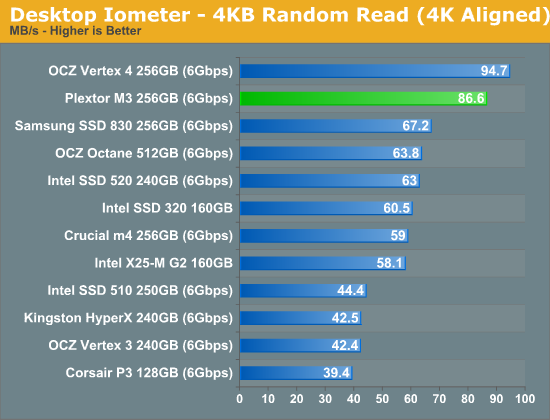
Plextor M3 provides very good 4KB random read performance. Looking at the Crucial m4 that uses the same Marvell controller, the Plextor M3 is 47% faster in random performance, so Plextor has clearly paid attention to their firmware.
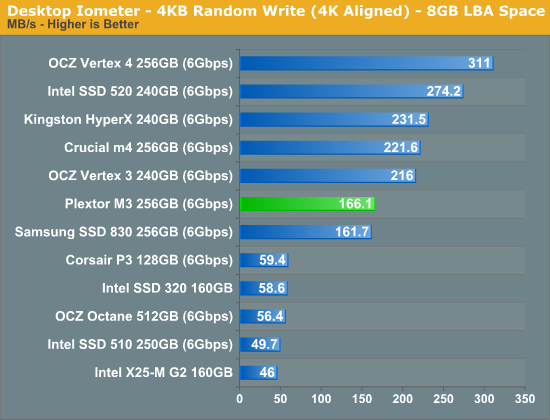
Random write performance is not as great as random read but still quite good enough for most workloads. This time Crucial's m4 comes out 33% faster than the M3, while the SF-2281 drives are all faster as well—write less data thanks to realtime compression and data deduplication techniques and your write speeds should generally be faster.
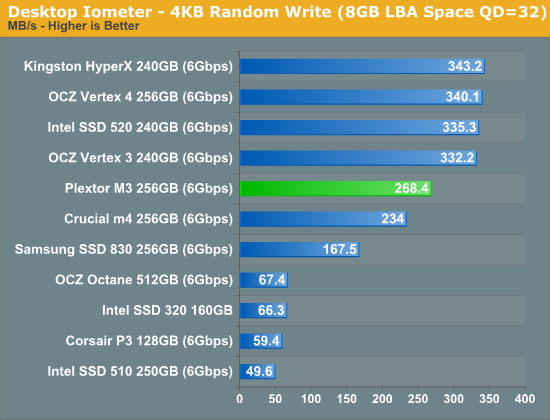
Switching the queue depth to 32 shows the difference between SandForce and non-SandForce quite well. SandForce is in its own class but among the Marvell SSDs, the Plextor M3 is the fastest. It's important to note that only heavy I/O workloads use queue depths that reach 32; most usage models don't go over 5.
Sequential Read/Write Speed
To measure sequential performance we ran a one minute long 128KB sequential test over the entire span of the drive at a queue depth of 1. The results reported are in average MB/s over the entire test length.
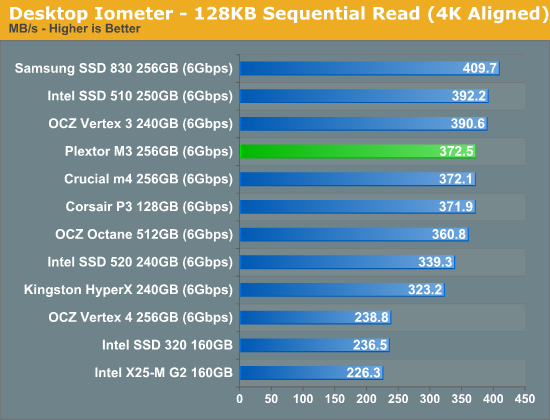
Sequential read speed is identical to Crucial m4 and Corsair P3, and good if not class leading for a SATA 6Gbps SSD.
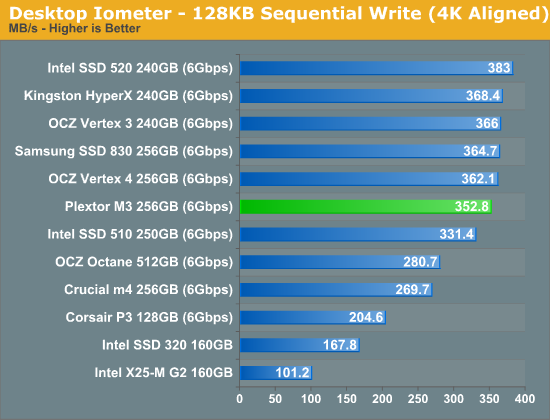
In sequential write speeds, the M3 is once again the fastest Marvell based SSD and is only a few percent behind SandForce based SSDs.










113 Comments
View All Comments
ecuador - Thursday, April 5, 2012 - link
He he, I read the article before the update and it sounded to me like it was written by a 15 year old! Little known Plextor... lolGood thing you updated, but in general when commenting on a company for an article do a little google search in case you are missing something ;)
JarredWalton - Thursday, April 5, 2012 - link
Just because you can google a company to read about them (Kristian had already done that -- note the paragraph about them being a subsidiary of Shinano Kenshi Corporation), it doesn't mean everyone out there is familiar with the company. I sort of laughed when Kristian said he hadn't head their name until a few months back, but then, there were plenty of companies I wouldn't have known a thing about when I was 17.Kristian Vättö - Thursday, April 5, 2012 - link
My point is that Plextor has not been in the spotlight for years. I was just surprised when the name came up because I seriously had not heard much about them. I consider myself to be pretty updated when it comes to the SSD front but I still had not heard the name Plextor until a few months back. That's why I wrote what I wrote. In SSD context, Plextor can be a new name for many, or at least it was for me :-)I admit that I did not know about their success in the ODD market in the 90s but then again, I was still spoon-fed at that time :-P
christoi - Thursday, April 5, 2012 - link
On the second page, on the test setup it says "Intel Core i7-2500K." I assume it's an i5 from the 3.3ghz clock?Kristian Vättö - Thursday, April 5, 2012 - link
Yeah, it's an i5. Thanks for the heads up, fixed it :-)BolleY2K - Thursday, April 5, 2012 - link
...are the 5 year warranty and the included version of Acronis True Image, which allows the user to easily clone his existing OS drive to the SSD.These two things are not included in the packages of most other SSDs on the market and in my opinion add to the value of the M3 package, so should be mentioned in the review.
Btw. I own the 128GB and am very pleased with it - easy installation (also due to the included software), good performance and entirely issue free so far. :-)
Kristian Vättö - Thursday, April 5, 2012 - link
At least my version did not come with Acronis True Image. The included clone utility is called Echo and is made by NTI. Not that it matters as the tool worked flawlessly when I copied my boot drive to the M3 :-)BolleY2K - Thursday, April 5, 2012 - link
Ah ok - I live in germany and over here you get Acronis. Well, as long as it works, it doesn´t matter how it is called I guess. ;-)I still think these 2 goodies should be mentioned and also kept in mind while discussing the price of the M3. Also the QA of these drives is very good - plextor states 20 hours of testing for every single SSD they ship and a RMA rate of 0,5%.
ckryan - Thursday, April 5, 2012 - link
I picked up a Plextor M3P, and here you get NTI.I went to try it out, and it did not play nice with Acronis which was on my system. After settting it up, the system reboots and loads a linux partition to do the copy operation... well, it didn't work, and then I couldn't get past the linux boot on subsequent restarts.
I could just revert to a clone from a week prior on another SSD, but not everybody has it like that.
The NTI Echo probably works quite well if you don't already have another clone suite installed like acronis.
The M3P is totally bitchin' though.
Jocelyn - Thursday, April 5, 2012 - link
I got my 256GB M3 for $290 in February and the 128GB often hits $150-$160. Anyway, Thanks for finally doing a review on the M3 and I <3 Toshiba Toggle Nand!!